News & Media
Leading Change seminar debates towards sustaining tomorrow
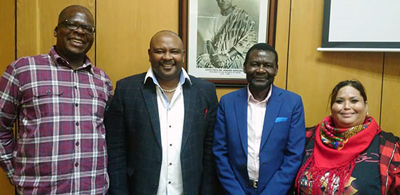
Prof Sabelo Ndlovu-Gatsheni (ED: CMU), Prof Vuyisile Msila (Director: CMU), Prof Tukumbi Lumumba-Kasongo (Wells College), and Prof Wendy Isaacs-Martin (AMRI) in front of a picture of Dr Kwame Nkrumah that the keynote speaker was excited to see.
“Priority to transform the ways of thinking and doing through education, using and promoting ubuntu and Pan-Africanism is a MUST; without that, even the progressive nationalists will not be able to be democratic and free in a world dominated by power and national interests,” said Prof Tukumbi Lumumba-Kasongo, from Wells College, Aurora, in New York. He was speaking during a Leading Change two-day seminar co-organised by Unisa’s Change Management Unit (CMU) and the Archie Mafeje Research Institute (AMRI) on 23 and 24 July 2018, entitled Ubuntu and Pan-Africanism: The dialectics of learning about Africa.
Lumumba-Kasongo believes that democracy and freedom are prerequisites for ubuntu and Pan-Africanism to be developed. Pan-Africanism, as a political realist ideology, requires that one becomes aware of one’s identity; where one stands in international politics, what one possesses, what one is capable of producing, the way to consume cultural or material production, and where one plans to go from here, said the distinguished African scholar.
In terms of institutions, Lumumba-Kasongo said that the nature and structures of the African nation-states must be transformed to allow Pan-African international cooperation and humanism (ubuntu) to be translated into policies and collective actions.
Learning from Pan-Africanism
“We should create Pan-African barometers/metrics with which we measure African progress, which in my view is not and cannot be sustained without a strong unified regionalist cultural and ideological project; Pan-African sets of rights should be developed and debated within the existing African institutions. These rights should be pragmatically protected as values through which Pan-Africanism can make firm inroads into people’s life, rooted both in economics and in the ethnic experiences of the black world.”
Lumumba-Kasongo cautioned the audience that existing political and economic structures are not conducive to the creation of structures in which ubuntu and Pan-Africanism can be fully developed because their actualisation requires genuine people’s participation in their local political process and collective leadership which can transcend the imperatives and constraints related to political territoriality, national sovereignty, and local citizenry to promote contemporary meaning of caring for collective wellbeing.
Similarly, the openness among African nation-states, countries, and people is the prerequisite for this new reshaping of African conditions and policies however this cannot be done randomly, he added.
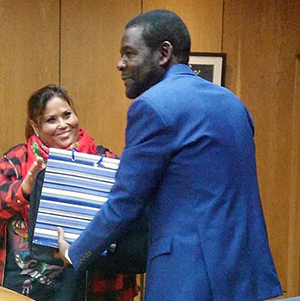
Prof Wendy Isaacs-Martin (AMRI) thanking Prof Tukumbi Lumumba-Kasongo (Wells College) for sharing his wisdom and thoughts with Unisans.
Pan-Africanism has been instrumental in the achievement of nominal political independence, but so far economic independence has eluded African people. This is because the alliance between black labour and black capital has not materialised due to the fact that the black world controls very little of the world monopoly capital. Hence Pan-Africanism needs an economic component in its ideology, argued Lumumba-Kasongo.
Incorporate ubuntu in the discourse of the nation-state ideology
On the second day of the seminar, Lumumba-Kasongo focused on ubuntu and he said, “democratic education, as well as education for development and peace should continue to be part of the discourse in order to find consensus about humanist progress, toward incorporating ubuntu in the discourse of the nation-state ideology or a philosophy upon which policies can be formulated for the benefits of all,” he suggested.
“Ubuntu is inspirational philosophy upon which a new model of education for all can be rooted. Ubuntu should be a new utopianism inspired from the past and still interwoven in disconnected and connected parts of African reality in the post-colonial era”.
For Agenda 2063: A Living and Dynamic Framework for Africa’s Development to be effectively and gradually implemented, the African collective solidarity (ubuntu) must be consolidated in the programs of eradication of poverty with social policies, in people’s participation in national projects, in promoting unity of rights, including those of citizens, and in Pan-African institutional building, he said.
In conclusion, he said ubuntu and Pan-Africanism should complement and re-enforce one another as transformative political, cultural forces and political philosophies.
The presentation was engaging and deliberately challenged the audience to delve into and beyond Africa’s systematic and epistemic debates.
By Lesego Ravhudzulo
Publish date: 2018-08-16 00:00:00.0

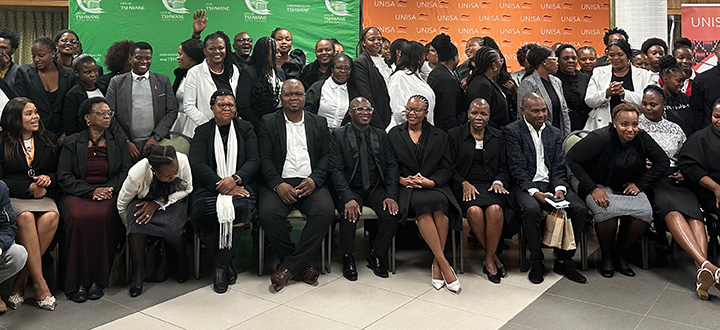 Unisa academics join hands to celebrate World Social Work Day
Unisa academics join hands to celebrate World Social Work Day
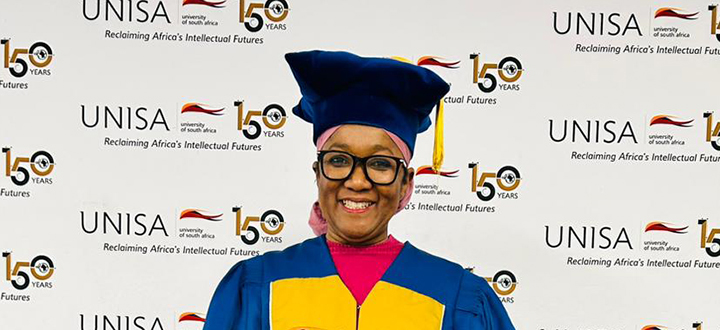 Unisa community engagement initiative targets school underperformance
Unisa community engagement initiative targets school underperformance
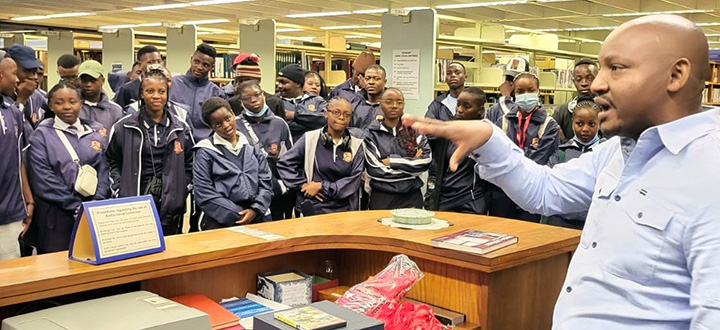 Library tour introduces learners to the wonderful world of Unisa
Library tour introduces learners to the wonderful world of Unisa
 Unisa Radio volunteer wins prestigious community journalism award
Unisa Radio volunteer wins prestigious community journalism award
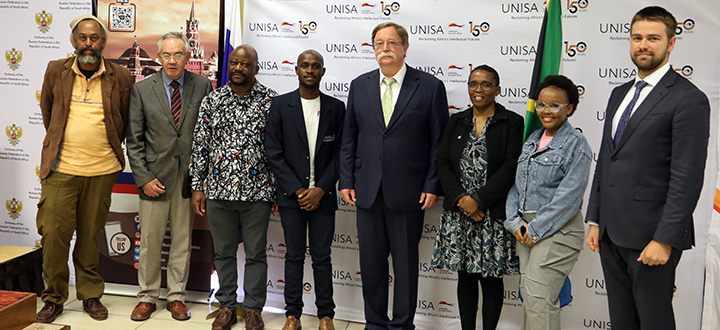 Unisa's student leadership engage with Russian ambassador
Unisa's student leadership engage with Russian ambassador